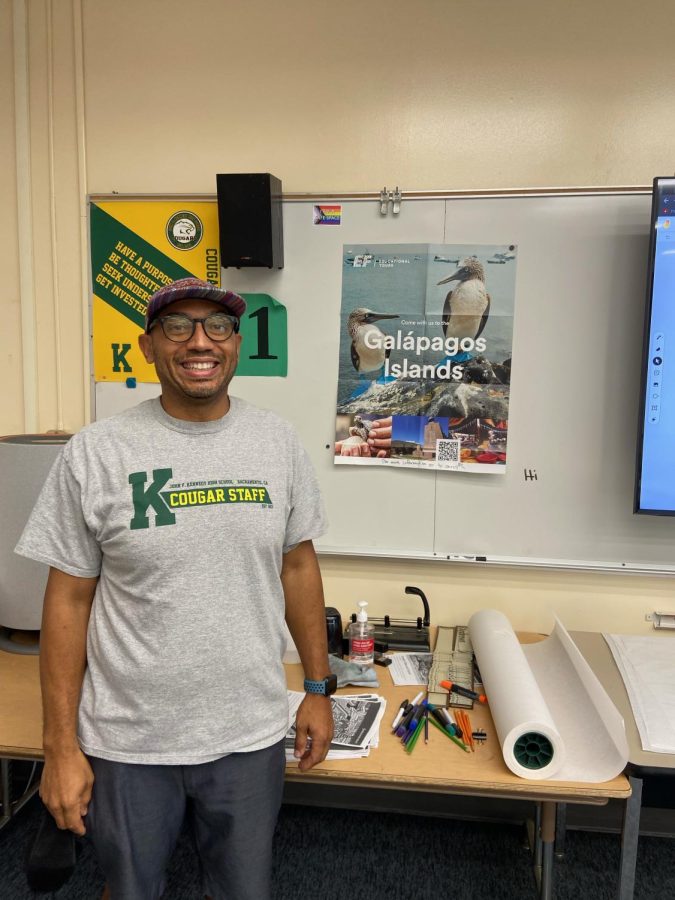In-person field trips return to Kennedy High’s PACE Program
AP World History PACE teacher Jonathan Andrews with announcement poster to the Galápagos Islands. Photo by Kaili Jiang. John F. Kennedy High School.
October 6, 2022
While many school routines have been brought back from pre-COVID school times, some are still slowly making their way back to the schedule, including in-person field trips for the John F. Kennedy High School Program in American and California Explorations (PACE).
PACE features uniquely designed English and history courses with an emphasis on California history, government, and literature, with writing across the curriculum.
As the pandemic spread around the world, COVID forced the implementation of stay-at-home quarantines for everyone, and students and teachers turned to virtual learning, using programs like Zoom and Google Meet, to get their education.
All homework, classwork, assessments, projects, and other school-related clubs or activities were done through computers or phones, including field trips. High school students participated in virtual tours of colleges, and elementary students had to explore their own homes in order to engage in some type of out-of-class activities.
Even after COVID guidelines allowed students and teachers to return to in-person learning, masks were no longer required, and other rules were lifted, the field trip experience was still at a low.
But as the global pandemic has receded, schools and programs like PACE at JFK have started to hand out permission slips for field trips to colleges and even some out-of-country places for the first time since “ sometime in March of 2020,” according to Advanced Placement U.S. History and PACE teacher Todd Whalen. “We had one scheduled for Stanford in 2020 that we had to cancel because we stopped coming to school.”
Students who had previously gone on many school trips pre-COVID, not only missed out on in-person school and seeing their friends in real life, but also their expeditions out to new places and, “. . . just doing things outside of school and class,” said Kaitlyn Lourenco, JFK junior and PACE student.
And students aren’t the only ones who missed the physical outings. Almost all teachers have wanted to bring these activities back, anything to let them feel a sense of normalcy, after two years of teaching to black boxes.
“I did kind of miss them. I think when they’re thought out and purposeful and not just see whatever college, they’re really good,” said AP World History PACE teacher Jonathan Andrews. “I think that they’re really meaningful and I know that they’re really hard for Miss Yee to plan.” Andrews referred to PACE program director Jennifer Yee.
The return of field trips has been helped by the fact that important destinations, such as colleges and museums, have loosened their COVID restrictions, though they do have some new COVID procedures and rules.
“We also had problems with some of the places we were going like college universities where they weren’t having in-person trips or just reduced numbers,” said Whalen. “Now the district allows field trips and colleges are back to normal, museums are back to normal so now we can go on trips without worrying about restrictions COVID placed on. As far as I know, everything is back to normal, the only new addition is that permission slips have to have a COVID waiver. So kids have to sign it in case they get COVID.”
Students also realize that the trips won’t be the same, and recognize what they have to do in order to stay safe.
“I think the best you can do is mask up,” said Lourenco.
Masking up is supported by teachers, but some, like Andrews, are more concerned about the process of planning the trips, rather than being too concerned about traveling again.
“We can’t do a field trip unless we get all the paperwork turned in 10 weeks before the actual trip. It makes it a lot harder because we can’t do as many field trips and we can’t require them as much as we used to (2 trips a year),” said Andrews. “Now it’s just like, ‘You should just go on one because you might enjoy it, y’know?’”
Some PACE students, like Lourenco, question how many field trips they will attend.
“Honestly…I probably won’t go on all field trips that will be offered,” said Lourenco. “Maybe just the ones that stick out to me.”
There may not be very many preeminent trips this year, at least in comparison to more meaningful trips in the past years.
“I used to take students on camping trips, the trips we used to go on were like big and crazy and fun,” said Andrews. “I think it allowed us to bond and learn on a deeper level.”


